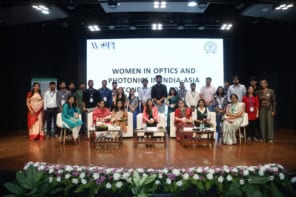Amy Smith argues that we need to rethink how we mark achievements in physics

Why is physics different from other sciences? While our perceptions of who does science are broadening – at least in terms of gender – our default image of a physicist remains firmly stuck in the past. Recent studies have shown that we still picture physicists as people who are more innately brilliant, more socially awkward, and less collaborative than those in other scientific disciplines.
These stereotypes are not only wrong – they can be damaging and can even put prospective physics students off entering the subject. For those already in the field, such stereotypes can make them feel more uncertain about their place in physics altogether. But where do these stereotypes come from? While the media are often blamed for caricatured depictions of physicists, and sometimes rightly so, the persistence of the brilliance stereotype may be down to us.
In one recent study, undergraduate physics students in the UK – alongside their non-physics peers – described physics as requiring more intelligence and being harder than any other science subject. Perhaps we shouldn’t be surprised given that you need such good grades to study physics at university, which embeds the notion of physics as an elite subject and an option only for the very best.
It is not all of physics, however, that is seen as elite. A study carried out in 2020 found that some physics disciplines such as theoretical physics were seen as more difficult and therefore requiring more intelligence than other areas such as experimental physics. In the study, Master’s students linked intelligence with credibility and so physicists were not celebrated unless they were studying theoretical physics.
This hierarchy of intelligence makes it almost impossible to gain the prestigious “genius status”. Although often described as a “bad habit” of physicists, such comparisons can affect students, who are forced to defend themselves against the view of “being not smart enough” for topics such as theoretical physics.
But although we think physicists are highly intelligent, few would describe themselves in this way. Studies have found imposter syndrome is especially prevalent among women and ethnic-minority students in physics who do not fit the typical physics genius stereotype. In trying to attain such status, it has been suggested that “passion” is the key ingredient for being recognized as a “proper physicist”.
However, the ability to devote oneself to physics depends on long work hours, which not only leads to a poor work–life balance but is simply impossible for some people with a disability or caring responsibilities. While high intelligence, or genius status, is almost synonymous with physics – it is inaccessible to most.
Praising collaboration
But what does “being smart” even mean in physics? Physicists, and in particular theoretical physicists, are seen as geniuses because much of the cognitive work they do is hidden from view of both the public and students. To dispel the myth of the lone genius, a team of US researchers led by astronomer Mike Verostek from the University of Rochester sought to reveal these hidden cognitive processes – all of which gets missed when we praise intelligence.
The team showed that theorists use a myriad of skills and processes, such as using analogies and assumptions when carrying out a task. Intelligence also means problem-solving, picking up a new skill quickly, having the curiosity to try new ideas or the resourcefulness to reassess old problems. In focusing on skills and processes, we encourage the notion that physics is something you can get better at and is not determined by some fixed level of intelligence when you are born.
In another study, the same team found that collaboration is essential for generating ideas in theoretical physics. When we talk about a physics genius, we often separate the individual from the collective efforts that may have helped in their achievements. As physicists we know that the advancement of physics can only be achieved by communicating with others, having cross-cultural awareness and being able to work in a team.

Why reforming scientific awards can help to tackle discrimination in physics
Praising individual intelligence and celebrating individuals hides this collaboration from the public and recreates the view that physics is a lone endeavour. We must therefore celebrate the interpersonal skills that are required within physics.
So, next time you discuss the Nobel prize, the newest scientific discovery, or the award for best physics undergraduate – think about what you really want to praise and what message you are sending. Are you praising a skill or an effort, a group or an individual, and is what you’re celebrating achievable for anyone with the right support?



